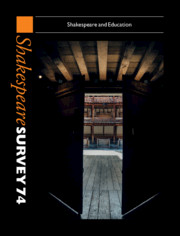Book contents
- Shakespeare Survey 74
- Shakespeare Survey
- Shakespeare Survey 74
- Copyright page
- Editor’s Note
- Contributors
- Contents
- Illustrations
- Whither Goest Thou, Public Shakespearian?
- Teaching Shakespeare in a Time of Hate
- Playful Pedagogy and Social Justice: Digital Embodiment in the Shakespeare Classroom
- Digital Resources, Teaching Online and Evolving International Pedagogic Practice
- Teaching Shakespeare with Performance Pedagogy in an Online Environment
- PPE for Shakespearians: Pandemic, Performance and Education
- ‘In India’: Shakespeare and Prison in Kolkata and Mysore
- Shakespeare for Cops
- Younger Generations and Empathic Communication: Learning to Feel in Another Language with Shakespeare at the Silvano Toti Globe Theatre in Rome
- Shakespeare in Nineteenth-Century Bengal: An Imperative of ‘New Learning’
- Forging a Republic of Letters: Shakespeare, Politics and a New University in Early Twentieth-Century Portugal
- Cultural Inclusivity and Student Shakespeare Performances in Late-Colonial Singapore, 1950–1959
- Using Performance to Strengthen the Higher Education Sector: Shakespeare in Twenty-First-Century Vietnam
- Counterpublic Shakespeares in the American Education Marketplace
- Taking Love’s Labour’s Lost Seriously
- The Thyestean Language of English Revenge Tragedy on the University and Popular Stages
- Going to School with(out) Shakespeare: Conversations with Edward’s Boys
- Intimacy and Schadenfreude in Reports of Problems in Early Modern Productions
- The True Tragedy as a Yorkist Play? Problems in Textual Transmission
- Henry VIII and Henry IX: Unlived Lives and Re-written Histories
- ‘And His Works in a Glass Case’: The Bard in the Garden and the Legacy of the Shakespeare Ladies Club
- Hamlet and John Austen’s Devil with a (Dis)pleasing Shape
- Shakespeare, #MeToo and his New Contemporaries
- ‘While Memory Holds a Seat in this Distracted Globe’: A Look Back at the Arden Shakespeare Third Series (1995–2020)
- Shakespeare Performances in England, 2020
- The Year’s Contribution to Shakespeare Studies
- ABSTRACTS OF ARTICLES IN SHAKESPEARE SURVEY 74
- Index
The True Tragedy as a Yorkist Play? Problems in Textual Transmission
Published online by Cambridge University Press: 28 August 2021
- Shakespeare Survey 74
- Shakespeare Survey
- Shakespeare Survey 74
- Copyright page
- Editor’s Note
- Contributors
- Contents
- Illustrations
- Whither Goest Thou, Public Shakespearian?
- Teaching Shakespeare in a Time of Hate
- Playful Pedagogy and Social Justice: Digital Embodiment in the Shakespeare Classroom
- Digital Resources, Teaching Online and Evolving International Pedagogic Practice
- Teaching Shakespeare with Performance Pedagogy in an Online Environment
- PPE for Shakespearians: Pandemic, Performance and Education
- ‘In India’: Shakespeare and Prison in Kolkata and Mysore
- Shakespeare for Cops
- Younger Generations and Empathic Communication: Learning to Feel in Another Language with Shakespeare at the Silvano Toti Globe Theatre in Rome
- Shakespeare in Nineteenth-Century Bengal: An Imperative of ‘New Learning’
- Forging a Republic of Letters: Shakespeare, Politics and a New University in Early Twentieth-Century Portugal
- Cultural Inclusivity and Student Shakespeare Performances in Late-Colonial Singapore, 1950–1959
- Using Performance to Strengthen the Higher Education Sector: Shakespeare in Twenty-First-Century Vietnam
- Counterpublic Shakespeares in the American Education Marketplace
- Taking Love’s Labour’s Lost Seriously
- The Thyestean Language of English Revenge Tragedy on the University and Popular Stages
- Going to School with(out) Shakespeare: Conversations with Edward’s Boys
- Intimacy and Schadenfreude in Reports of Problems in Early Modern Productions
- The True Tragedy as a Yorkist Play? Problems in Textual Transmission
- Henry VIII and Henry IX: Unlived Lives and Re-written Histories
- ‘And His Works in a Glass Case’: The Bard in the Garden and the Legacy of the Shakespeare Ladies Club
- Hamlet and John Austen’s Devil with a (Dis)pleasing Shape
- Shakespeare, #MeToo and his New Contemporaries
- ‘While Memory Holds a Seat in this Distracted Globe’: A Look Back at the Arden Shakespeare Third Series (1995–2020)
- Shakespeare Performances in England, 2020
- The Year’s Contribution to Shakespeare Studies
- ABSTRACTS OF ARTICLES IN SHAKESPEARE SURVEY 74
- Index
Summary
There are many linguistic differences between the two variant texts (octavo and folio) of Henry VI Part 3. One feature which has been largely overlooked by critics is evidence of a fairly consistent pro-Yorkist bias in the octavo of 1595. Richard of York’s assertion that the throne is ‘mine inheritance as the kingdome is’ (sig. A3v) is modified in the folio to ‘as the earldom was’ (1.1.78), placing his claim as the next step on the ladder of ambition rather than the assertion of a de jure fact. On the field of Towton, in which Edward leads the Yorkists to their greatest triumph, Warwick declares that he will soon ‘be crowned Englands lawfull king’ (sig. C5 r); the folio line is ‘England’s royal king’ (2.6.88), ambiguously suggesting that Edward will be royalized in an act of realpolitik. When an oath is sworn to effect a return to the Yorkist bloodline after Henry’s death, the octavo text includes four lines not in the folio, in which Henry concedes that Richard is king ‘by right and equitie’ (sig.
- Type
- Chapter
- Information
- Shakespeare Survey 74Shakespeare and Education, pp. 271 - 282Publisher: Cambridge University PressPrint publication year: 2021

